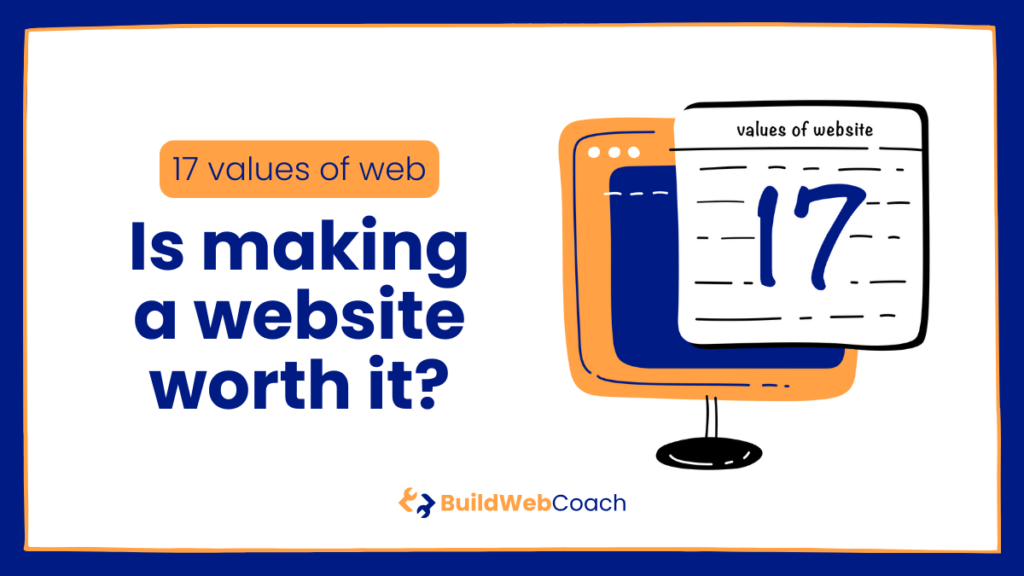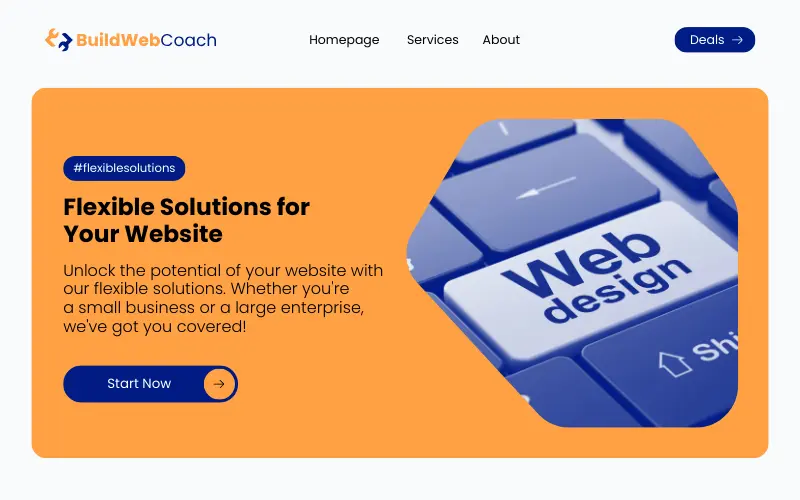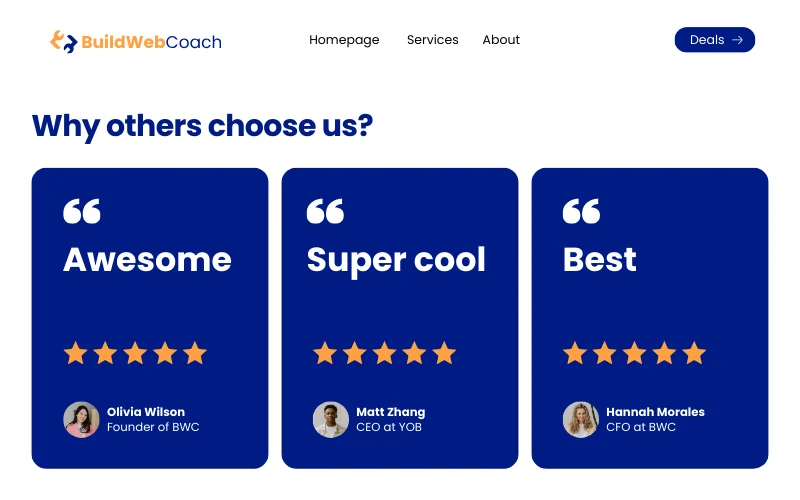Last Updated on July 19, 2024
Nowadays, when almost every company and more and more individuals have a website, you can naturally ask yourself whether it is worth investing time, effort, and money in creating your web presentation. In the following article, we will describe in detail the advantages of a website that it can bring you. We are sure you will realize the value of web projects better than ever.
A website is much more than a digital business card; it’s a platform that showcases your work, highlights your credibility, and serves as the cornerstone of your online presence. Considering that most consumers turn to the internet for information on products and services, not having a website might cause you to miss out on valuable opportunities for growth and customer engagement. From my experience, I can confirm that many clients are looking for my services, price lists, contact information, and more on my website through Google. If I didn’t have a website, I would be missing out on many potential customers who come to me through the online world. So, at the very least, owning a website can positively impact your online reach and lead flow, whether you’re an individual or a business.
Having a website also allows for operational efficiency that can transform your business. Whether streamlining processes through online forms or expanding your market reach beyond geographical boundaries, a website opens a channel for potential customers to find and engage with you anytime. Regardless of your sector or industry, it provides the necessary leverage to stand out in a crowded market. From a design perspective, your website serves as a canvas to communicate your brand message and values in a way that resonates with your audience. Just the fact that someone visits your website, which will have a visually pleasing effect on them, can positively affect how that person perceives you and your activity.

Is Making a Website Worth It?
Key Takeaways
- A website enhances credibility and showcases professionalism.
- An online presence through a website allows operational efficiencies.
- Your website communicates your brand’s message effectively.
- Is Making a Website Worth It? Key Takeaways
- Understanding the Value of a Website
- 1. Defining an Online Identity
- 2. Capitalizing on the Digital Age
- 3. Central Hub for Your Marketing Efforts
- 4. Building Trust and Credibility
- 5. Enhancing Professionalism
- 6. Improving Business Visibility
- 7. Competitive Advantage
- 8. Cultivating Customer Connections
- 9. Promoting Services and Products
- 10. Optimizing for Conversion
- 11. Analyzing and Adapting
- 12. Website as an Investment
- 13. Keeping Up with Consumer Behavior
- 14. Leveraging Content Creation
- 15. Utilizing SEO to Reach the Right Audience
- 16. Improving User Experience
- 17. Expanding Your Reach Through Social Media
- Showcasing Your Work and Credentials
- Facilitating Business Operations
- Design and Technical Considerations
- Frequently Asked Questions
Understanding the Value of a Website
The value of a website goes far beyond mere online presence. A website is a precious asset that supports your business. From establishing a brand identity to enhancing visibility and fostering customer relationships, the web is a cornerstone for your success in the online world that dominates the twenty-first century.
1. Defining an Online Identity
Your website is your digital storefront, offering a platform to show who you are and your goals. A well-defined online identity establishes you as a professional in your field. It sets the foundation for all digital interactions, and naturally, this can help you develop new contacts or contracts.
2. Capitalizing on the Digital Age
Being present in the digital world means more than having a Facebook page. Indeed, you know that people expect your presence on various platforms, from the web, through Instagram to Facebook. It means embracing the internet as a powerful venue for conducting business. Your website ensures you are where your potential customers are – online. A quality web presentation is the foundation of your success, with which everything begins.

3. Central Hub for Your Marketing Efforts
Think of your website as the central hub for your marketing efforts. It’s where email marketing, social media, and other marketing activities converge, helping you to streamline and coordinate all aspects of digital marketing.
4. Building Trust and Credibility
Incorporate testimonials and reviews on your website to build trust and establish credibility. These social proofs signal to newcomers that you’re a reputable business worthy of their attention and trust.
TIP: I know from experience that positive references, whether on a website or a Google Business profile, attract the attention of those interested in your services. Convince online users who visit your website that you are trustworthy professionals who do their job responsibly. Build a good reputation.

5. Enhancing Professionalism
A business website communicates professionalism. It shows that you are an expert and an authority in your industry, someone who invests in their brand and values their clients.
TIP: Building authority in your industry is also about regularly creating high-quality content. Thanks to it, you gradually build respect in the online environment.
6. Improving Business Visibility
Having a website optimizes your chance to appear in Google search results, enhancing your business’s visibility. Organic traffic from search engines can lead to new customers and grow your business.
7. Competitive Advantage
A sophisticated website can give you a leg-up over your competitors. It’s an arena where you can highlight your unique selling points and outrun the competition in your industry.
TIP: You can try starting by looking at your competitors’ websites. Thanks to this, you will have an overview of how your competitors are doing, what distinguishes their web presentations, and where there is room for improvement. Thanks to this, you can create an even more perfect presentation and overtake your competitors in areas in which they are not very convincing.
8. Cultivating Customer Connections
Your website allows you to cultivate deeper connections with your audience. Engaging content and interactive features can foster a sense of community and keep clients returning.
9. Promoting Services and Products
Highlight your services and products on your website, providing easy access to what you offer. It also ensures that potential leads find what they’re looking for when they visit.
10. Optimizing for Conversion
A website enables you to fine-tune every aspect of the user experience to optimize for conversion. Calls-to-action (CTAs) can guide visitors to take desirable actions, boosting sales.
11. Analyzing and Adapting
Tools like Google Analytics provide insights into your website’s performance, allowing you to update and adapt strategies for continuous growth.
12. Website as an Investment
Consider your website a cost-effective investment with a high return on investment (ROI). It works around the clock, reaching consumers and accruing value over time.
TIP: Every website has its value. If you decide to build a high-quality website with quality content, it can inevitably have a very high value in the future. Looking around the Internet, you will see that only some old domains are sold for very high prices. Let alone quality websites with a credible history. So it is good to know that you are building a website for a good name and a successful connection with customers, but above all, it is your valuable investment that will not be lost.
13. Keeping Up with Consumer Behavior
As online consumer behavior evolves, websites need to adapt to these trends. Remaining relevant means keeping pace with how people use the internet to find what they need.
14. Leveraging Content Creation
Content is king in digital marketing. Your website’s blog posts and articles inform and serve as a magnet for SEO, driving more traffic to your site.
15. Utilizing SEO to Reach the Right Audience
Search Engine Optimization (SEO) is pivotal to reaching the right audience. Properly executed SEO strategies on your website ensure that Google notices and that customers find you.
16. Improving User Experience
Ensure your website is user-friendly and mobile-friendly to accommodate the modern internet user. An enjoyable experience on your site can translate into more extended visits and more leads.
17. Expanding Your Reach Through Social Media
Integrating your social media profiles and channels with your website furthers your engagement outreach. Sharing content across platforms amplifies your voice and extends your brand’s reach.
Showcasing Your Work and Credentials
A personal or professional website allows you to combine your portfolio, resume, and testimonials into one cohesive narrative that can strategically present your skills and accomplishments to potential employers, clients, or collaborators. Judge for yourself that this is the perfect way to show your strengths to the entire online world.
Portfolio to Exhibit Expertise
An online portfolio is more than just a collection of past works; it acts as your virtual exhibition space. By meticulously curating content, you effectively demonstrate your expertise and unique style. A well-organized portfolio:
- Visuals: Includes high-quality images or videos of your best work.
- Descriptions: Brief, context-giving explanations accompanying each piece.
Resume and Professional Achievements
Your website serves as a dynamic version of your resume, allowing you to list your professional experiences and educational background and enhance them with interactive elements. Features to include:
- Interactive Timeline: A chronological display of your career milestones.
- Downloadable CV: A complete, up-to-date resume available for download.
Case Studies and Client Feedback
Incorporating case studies and compiling client feedback on your site solidifies your reputation as a skilled professional. This section can:
- Demonstrate Outcomes: Show how your work has achieved specific results for past clients.
- Testimonials: Include direct quotes from clients, reflecting their favorable experiences with your services.
By presenting your work, achievements, and client satisfaction in a structured way, your website becomes the gateway to new opportunities and an indispensable tool for personal promotion.
Facilitating Business Operations
A website is a dynamic tool for streamlining business operations, from customer engagement to sales enhancement. It leverages technology to manage interactions and transactions better and more efficiently.
Simplifying Customer Engagement
With your website, customers can easily find contact information, engage with your brand, and submit inquiries, resulting in an efficient accrual of leads. Providing a contact form or live chat facilitates real-time communication and opens the door for improved customer service. Thanks to modern tools, your website visitors will connect with you better.
Streamlining Sales and Offers
Your website is a powerful platform to highlight sales and offers, allowing you to update content quickly and promote current deals. E-commerce capabilities enable an automated sales process where customers can purchase your products or services directly online, enhancing the shopping experience.
Automating Marketing Strategies
Implement marketing strategies effectively by integrating tools for automating marketing activities. Utilize your website to run targeted ad campaigns, track user engagement, and optimize your outreach. It drives consistent traffic and helps convert visitors into customers with less hands-on time required from you.
Design and Technical Considerations
Attention to design and technical details is pivotal when creating a website. These factors affect the user experience and how effectively your site serves its purpose.
Choosing the Right Website Builder
Selecting a website builder is a crucial step for your online presence. Builders like WordPress (Gutenberg Editor) offer extensive customization with access to numerous plugins and themes, allowing you to tailor your site to your needs without extensive code. On the other hand, website builders like Wix or Squarespace offer a more user-friendly interface and predefined templates for those less familiar with web design.
Importance of Good Web Design
Good web design is at the heart of a successful website. It entails coherent color schemes, typography, and judicious use of images and videos to create an aesthetically pleasing and intuitive user experience. Websites with exceptional design can command attention, foster engagement, and influence how visitors perceive your brand.
Ensuring Mobile Compatibility
With the growing prevalence of mobile usage, your website must be responsive and mobile-friendly. Ensuring the site’s design adapts to various screen sizes without compromising functionality is crucial. Mobile compatibility enhances accessibility and can significantly improve search engine rankings. It should be noted that compatibility with mobile devices is the number 1 priority for Google today.
Handling Domain and Hosting
Your website’s domain name is its address on the web, and choosing one that reflects your brand and is easily memorable is imperative. On the other hand, hosting is where your website ‘lives’ on the internet. Opting for a reliable hosting provider like Hostinger can ensure your website remains accessible and loads quickly – essential for keeping visitors engaged. Hostinger is known for its affordable plans that cater to websites of varying sizes, offering a balance of cost-effectiveness and robust performance. We highly recommend our domain and hosting article if you want to learn more about this issue.
